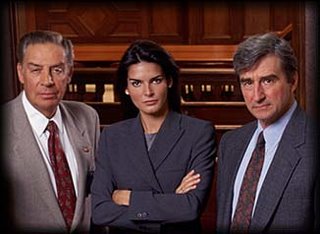Exams can be really stressful. Every second you spend away from your studying, you feel like someone else is getting ahead of you. But 18 hours/day can be draining, so you really do need a break. Hence when I recently got my hands on a hilarious article by Professor James D. Gordon, of BYU law school, it provided some much needed comic relief. This article was amusingly published in the prestigious
Yale Law Journal back in 1991. The theme of the piece is the silliness of law school; Gordon pokes fun at nearly every aspect of law school life. Though his style can occasionally be a bit over-the-top for my comedic taste, I have to admit I roared as I read through his section on exams. Maybe it just hit a little close to home this week.
In an effort to lighten the mood for all my classmates who read this blog (and hopefully for you others as well), I'm going to post the exam part of the article here in installments over the next couple of days. And since I'm studying for my copyright exam right now, let me make the disclaimer that I'm posting these sections on this blog for fair use purposes; I invite any comments on Professor Gordon's remarks. This is totally academic, not infringement.
Without further ado, I bring you installment #1:
Studies have shown that the best way to learn is to have frequent exams on small amounts of material and to receive lots of feedback from the teacher. Consequently, law school does none of this. Anyone can learn under ideal conditions; law school is supposed to be an intellectual challenge. Therefore, law professors give only one exam, the FINAL EXAM OF THE LIVING DEAD, and they give absolutely no feedback before then. Actually, they give no feedback after then, either, because they don't return the exams to the students. A few students go and look at their exams after they are graded, but this is a complete waste of time, unless they just want to see again what they wrote and have a combat veteran-type flashback of the whole horrific nightmare. The professors never write any comments on the exams. That might permit you to do better next time, which would upset the class ranking.
Another reason that law professors give only one exam is that, basically, they are lazier than three-toed sloths. They teach half as many hours as other professors, are paid twice as much, and get promoted three times as fast. Then, they whine like three-year-olds because they have to grade one exam per class. I mean, this is every single semester, year in and year out. The constant grind is enough to kill a person, I tell you.
 Took my last final this afternoon!! Criminal Adjudication. The professor wrote it, intending we'd take it in about three hours, but he allotted us four just so we'd have plenty of time. I know so little about criminal adjudication that I took the full four hours, right up until the last second. Hahaha
Took my last final this afternoon!! Criminal Adjudication. The professor wrote it, intending we'd take it in about three hours, but he allotted us four just so we'd have plenty of time. I know so little about criminal adjudication that I took the full four hours, right up until the last second. Hahaha

